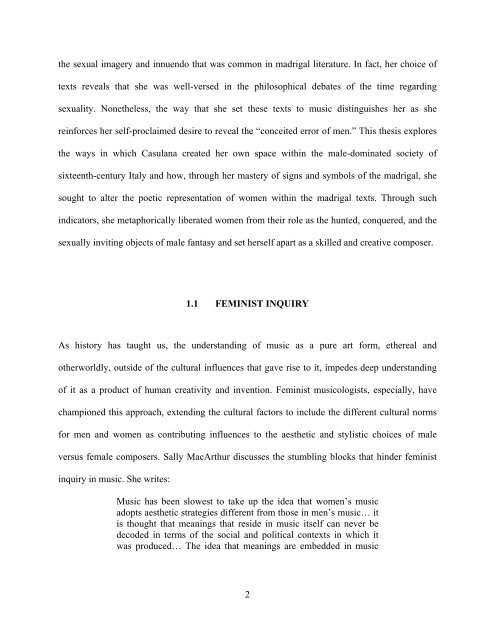Download - D-Scholarship@Pitt - University of Pittsburgh
Download - D-Scholarship@Pitt - University of Pittsburgh
Download - D-Scholarship@Pitt - University of Pittsburgh
You also want an ePaper? Increase the reach of your titles
YUMPU automatically turns print PDFs into web optimized ePapers that Google loves.
the sexual imagery and innuendo that was common in madrigal literature. In fact, her choice <strong>of</strong><br />
texts reveals that she was well-versed in the philosophical debates <strong>of</strong> the time regarding<br />
sexuality. Nonetheless, the way that she set these texts to music distinguishes her as she<br />
reinforces her self-proclaimed desire to reveal the “conceited error <strong>of</strong> men.” This thesis explores<br />
the ways in which Casulana created her own space within the male-dominated society <strong>of</strong><br />
sixteenth-century Italy and how, through her mastery <strong>of</strong> signs and symbols <strong>of</strong> the madrigal, she<br />
sought to alter the poetic representation <strong>of</strong> women within the madrigal texts. Through such<br />
indicators, she metaphorically liberated women from their role as the hunted, conquered, and the<br />
sexually inviting objects <strong>of</strong> male fantasy and set herself apart as a skilled and creative composer.<br />
1.1 FEMINIST INQUIRY<br />
As history has taught us, the understanding <strong>of</strong> music as a pure art form, ethereal and<br />
otherworldly, outside <strong>of</strong> the cultural influences that gave rise to it, impedes deep understanding<br />
<strong>of</strong> it as a product <strong>of</strong> human creativity and invention. Feminist musicologists, especially, have<br />
championed this approach, extending the cultural factors to include the different cultural norms<br />
for men and women as contributing influences to the aesthetic and stylistic choices <strong>of</strong> male<br />
versus female composers. Sally MacArthur discusses the stumbling blocks that hinder feminist<br />
inquiry in music. She writes:<br />
Music has been slowest to take up the idea that women’s music<br />
adopts aesthetic strategies different from those in men’s music… it<br />
is thought that meanings that reside in music itself can never be<br />
decoded in terms <strong>of</strong> the social and political contexts in which it<br />
was produced… The idea that meanings are embedded in music<br />
2















